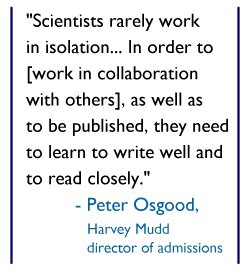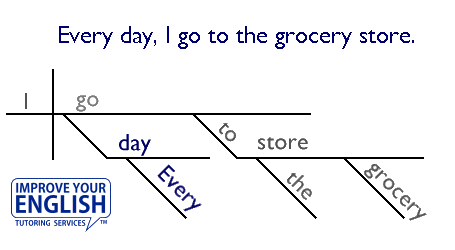| |
Dear English students,
Whenever I hire
a new tutor, I always try to find one who is at least as good
I am. That's a high standard, if I do say so myself. When
you meet our new employees, however, I think you'll agree
that we met or exceeded the mark.
I reviewed more
than 575 resumes before asking Nat Crawford and Teresa Kim
to join my team. If you or your child needs an English tutor,
you'll find they’re the best there is.
I invite you to
sign up for lessons or to refer someone you know.
Think of the importance
of English skills in high school, in college, and in the workplace.
Then please come back to study with us or tell a friend.
Thanks for reading,
and please write to us if you wish. I'd love to read your
comments.
Respectfully yours,

Steve High,
President
Back
to Improve Your English
| More
Newsletters
|
|
 Steve
High, president
Steve
High, president
|
Harvey
Mudd College
Home to Top Engineers and Scientists |
|
 Harvey
Mudd College (HMC) is a member of the Claremont University Consortium,
a group of undergraduate and graduate colleges in Southern California.
Named for Harvey Seeley Mudd, a mining engineer, this college is
one of the country’s best institutions for undergraduate education,
according to Princeton Review. And in the 2009 edition of “America’s
Best Colleges,” U.S. News & World Report ranks Harvey
Mudd No. 2 in the nation for undergraduate engineering and No. 14
among all four-year liberal arts colleges. Harvey
Mudd College (HMC) is a member of the Claremont University Consortium,
a group of undergraduate and graduate colleges in Southern California.
Named for Harvey Seeley Mudd, a mining engineer, this college is
one of the country’s best institutions for undergraduate education,
according to Princeton Review. And in the 2009 edition of “America’s
Best Colleges,” U.S. News & World Report ranks Harvey
Mudd No. 2 in the nation for undergraduate engineering and No. 14
among all four-year liberal arts colleges.
An astonishing 35 percent
of Harvey Mudd’s graduates have gone on to earn doctoral degrees,
according to a 2008 study by the National Science Foundation. With
a student-to-faculty ratio of less than nine-to-one and a quiet,
nearly crime-free campus, Harvey Mudd should be on the short list
of any student considering a scientific or technical major.
Although
Harvey Mudd College specializes in the education of engineers, scientists,
and mathematicians, all students also study the humanities and social
sciences. “Good English and communications skills are critical
to all our students for several reasons,” said Harvey Mudd’s
director of admissions, Peter Osgood. “Scientists and engineers
are at the cutting edge of their fields, meaning that they must
not only be good problem solvers, but they must be able to communicate
their work to others in clear English. Scientists rarely work
in isolation; they are better served working in collaboration with
others. In order to do this, as well as to be published, they need
to learn to write well and to read closely.”
Juniors and seniors work
on real-world technical projects for entrepreneurs, companies, and
government agencies as part of Harvey Mudd’s well-regarded
Clinic Program.
Harvey Mudd College is
in Claremont, a quiet suburb 35 miles east of Los Angeles, less
than an hour from the Pacific Ocean. Most of Harvey Mudd’s
756 students live on campus. According to Osgood, the makeup of
the current student body is 60 percent white, 17-20 percent Asian
American, 8 percent multiracial Asian and white, 6 percent Hispanic,
and 2.5 percent other.
Next
time: San Jose State University
Newsletter
Table of Contents |
More Newsletters |
Back to
Improve Your English
|
|
“Everyday”
Versus “Every Day”

Nat Crawford,
director of tutoring
|
|
|
by
Nat Crawford
Everyday is
an adjective.
It sometimes
means "ordinary."
I put on a pair of everyday jeans and went to the grocery
store.
 |
|
Click
to enlarge.
|
Sometimes everyday
means “happening daily.”
I did some everyday chores and then went to bed.
Every day
is an adverbial objective.
It means “each
day.”
Every day,
I go to the grocery store.
 |
|
Click
to enlarge.
|
For
answers to specific writing questions, email us here.
Who knows? Your question may inspire our next article on Misused
Words.
Newsletter
Table of Contents |
More Newsletters |
Back to
Improve Your English
|
| |
|
|
|
|
Cue
Your Reader With Transitions
Adverbs That Indicate a Narrative
by
Teresa Kim
Writing a
grammatical sentence is the necessary beginning for
any writer. A simple sentence
conveys a piece of information; when you write a
simple sentence or even a string of simple sentences,
you are making logical or narrative statements. The
proper transitions, though, help readers follow your
story or your argument. As your writing (and therefore
your thinking) grows more sophisticated, the right cues
can help readers follow your story, your line of reasoning,
or your train of thought.
It
is easy to cue readers in narrative writing with conjunctive
adverbs. A list of the most common ones appears
in the glossary
of Write it Right With Strunk & White. Others
include the following:
again
earlier
eventually
finally
first |
|
formerly
lately
meanwhile
next
now
presently |
|
shortly
simultaneously
so far
soon
subsequently
thereafter |
|
|
 |
|
Teresa
Kim,
tutor
|
|
As with any other
device, use these tools as needed. It may be tempting to use
them everywhere, to ensure that your readers are following you.
But if the information you’re conveying is simple, you
should avoid excessive and unnecessary transitions. Consider
this example:
First,
I ran down
the stairs and headed straight for the Christmas tree.
Next, I sorted all the presents into piles. Then,
I counted how many presents I had. Eventually, I
was sad to find my brother had more presents than I!
Even without the
boldfaced adverbs, the events flow easily for a reader because
(a) the information is simple and predictable and (b) the
sentences are grammatically uncomplicated. Using too many
unnecessary adverbs makes your writing sound elementary, as
if your intention were to write from the perspective of a
stuffed teddy bear “of very little brain”:
Winnie-the-Pooh
sat down at the foot of the tree, put his head between his
paws, and began to think.
First of all he said to himself: "That buzzing-noise
means something. You don't get a buzzing-noise like that,
just buzzing and buzzing, without meaning something. If
there's a buzzing-noise, somebody's making a buzzing-noise,
and the only reason for making a buzzing-noise that
I know of is because you're a bee."
Then he thought another long time, and said: "And
the only reason for being a bee that I know of is making
honey."
And then he got up, and said: "And
the only reason for making honey is so as I can eat it."
So he began to climb the tree.
A.
A. Milne, Winnie-the-Pooh
Next
time: Using Transitions Pt. 2: Adverbs & Conjunctions
that Indicate a Sequence in Logic
(like the underlined words in the Milne quotation.)
For answers to specific writing questions,
email us here.
Who
knows? Your question may
inspire our next article on Writing
Tips.
Newsletter
Table of Contents |
More Newsletters |
Back to
Improve Your English
|
|
|
|
|





 Harvey
Mudd College (HMC) is a member of the Claremont University Consortium,
a group of undergraduate and graduate colleges in Southern California.
Named for Harvey Seeley Mudd, a mining engineer, this college is
one of the country’s best institutions for undergraduate education,
according to Princeton Review. And in the 2009 edition of “America’s
Best Colleges,” U.S. News & World Report ranks Harvey
Mudd No. 2 in the nation for undergraduate engineering and No. 14
among all four-year liberal arts colleges.
Harvey
Mudd College (HMC) is a member of the Claremont University Consortium,
a group of undergraduate and graduate colleges in Southern California.
Named for Harvey Seeley Mudd, a mining engineer, this college is
one of the country’s best institutions for undergraduate education,
according to Princeton Review. And in the 2009 edition of “America’s
Best Colleges,” U.S. News & World Report ranks Harvey
Mudd No. 2 in the nation for undergraduate engineering and No. 14
among all four-year liberal arts colleges. 


